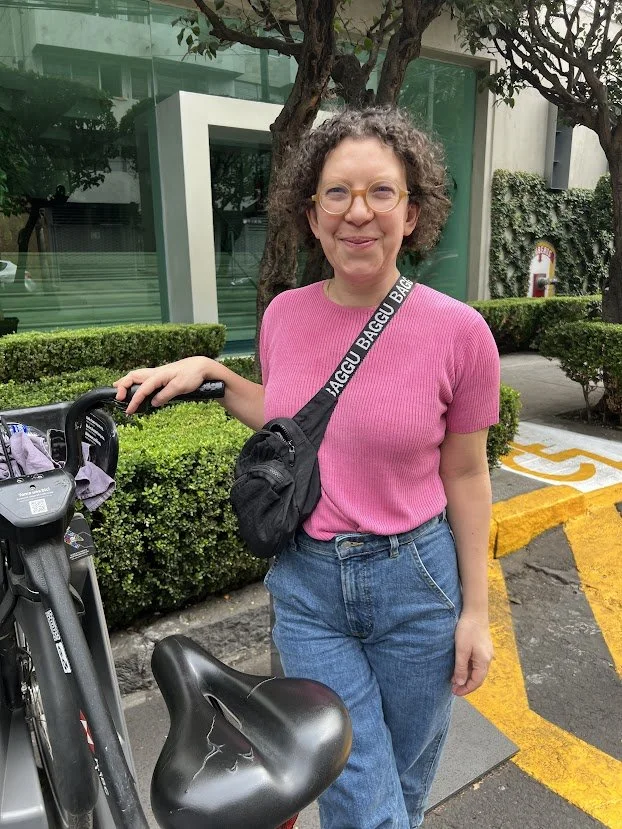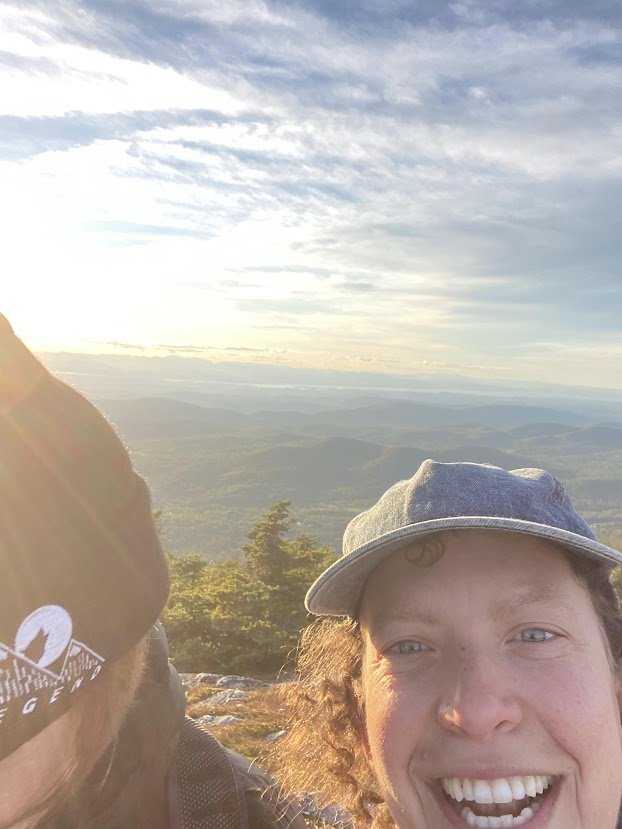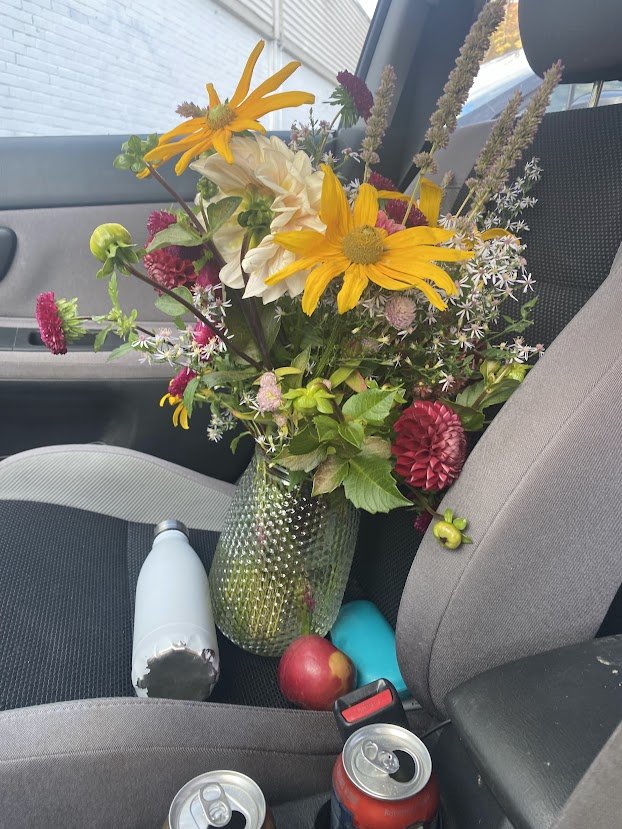You deserve a relationship with your body that feels like home.
Therapy for Eating Disorders and Body Image in Vermont
hey! 👋 I’m Lizzie.
If you’ve been quietly carrying a complicated relationship with food or your body, you’re not alone—and you’re not broken. In fact, your patterns probably make perfect sense given the culture we live in. But you don’t have to stay stuck in them.
I’m Lizzie (she/her), a licensed therapist offering virtual therapy across Vermont—including Burlington, Chittenden County, Southern Vermont, and the Northeast Kingdom.
I support women and LGBTQIA+ adults who are ready to shift their relationship with food, movement, and body image in a sustainable, non-performative, deeply human way.
This is not about becoming a “better” version of yourself
In a world that constantly tells you to be smaller, quieter, or more in control, therapy offers something radical: a chance to be fully, completely yourself. No fixing. No before-and-after stories. Just space to explore, heal, and reconnect—with your body, your emotions, your needs, and your joy.
Together, we’ll get curious (not judgmental) about what’s going on underneath the patterns. We’ll notice what your nervous system needs. We’ll build practices for trust, safety, and self-compassion. And we’ll find moments of lightness along the way.
You don’t need a diagnosis to work with me. You don’t have to hit rock bottom. You’re allowed to want more ease, more connection, more aliveness—no matter where you're starting from.
what working with me is actually like
*
what working with me is actually like *
Therapy with me is spacious, collaborative, and rooted in care. I bring a lot of energy and presence to our work—and I genuinely enjoy getting to know my clients as full, complex humans. I’m not the kind of therapist who nods quietly and waits for you to come to your own conclusions.
I’ll be in it with you—curious, compassionate, and gently challenging when that’s helpful.
We’ll explore things at your pace, with room for reflection, experimentation, and humor along the way. Some days we’ll go deep; other days we might focus on regulation or building simple practices that support you in your daily life. Every session is shaped by your goals, your needs, and what’s coming up for you in real time.
I’m committed to creating a space where you can be fully yourself—messy, brilliant, tired, brave, scared, growing.
I draw from a blend of approaches that help you feel safer and more connected—physically, emotionally, and relationally. These include:
EMDR: to process past experiences that still feel stuck
Somatic therapy: to gently bring your body back into the conversation
Narrative therapy: to reimagine the stories you've been told about your body and worth
Relational work: because healing often happens in connection
My approach: grounded, integrative, trauma-informed
Healing from eating disorders and body image struggles isn’t about achieving a “perfect” relationship with food. It’s about building something more real, more flexible, and more forgiving.
This work can help you feel:
More at home in your body
Less consumed by food thoughts or appearance worries
More present in your life and relationships
More aware of your needs and better able to meet them
Like your body is part of you, not a project to manage
Connected to a sense of purpose, joy, or groundedness—even on the hard days
Wondering what eating disorder therapy in Vermont is actually like?
Here are some questions folks often ask before getting started.
-
Yes—absolutely. Eating disorder therapy is a powerful, effective way to begin healing your relationship with food, your body, and yourself. Whether you're navigating binge eating, restriction, obsessive thoughts about food or weight, or just feeling disconnected from your body, therapy can help.
As a licensed therapist based in Burlington, Vermont, I specialize in working with women and LGBTQIA+ adults across the state who are seeking compassionate, non-judgmental care. We’ll move at your pace and focus on what you want to shift, without pressure to meet external standards or labels. You don't have to do this alone, and you don't have to wait until things get worse to seek support.
-
There’s no one-size-fits-all approach—because no two people are the same. In my work as an eating disorder therapist in Vermont, I use a blend of EMDR, somatic therapy, and narrative therapy to support healing from the inside out.
That means we’ll work with your nervous system, your story, and your lived experience. Some days that looks like processing the past. Other days it might be about developing new ways to relate to food, movement, or your emotions. I also integrate principles from Health at Every Size®, intuitive eating, and body liberation frameworks, so your healing doesn’t come at the expense of your autonomy.
-
Yes, but probably not in the way diet culture has taught you to think about “help.” Therapy won’t give you a strict food plan or hold you accountable to a weight goal. Instead, we’ll explore the patterns behind your eating habits and what they might be trying to communicate.
As a Vermont-based eating disorder therapist, my goal is to help you build a more flexible, nourishing, and peaceful relationship with food—one that’s rooted in your values, your needs, and your lived reality. Real change comes from compassion, not control.
-
That’s more common than you think. Many of my clients have been in therapy before and have a solid intellectual understanding of their struggles—but still feel stuck in the same patterns.
Our work will focus on helping you feel differently, not just think differently. Through trauma-informed, body-based practices and relational healing, we’ll move toward change that’s felt and integrated—not just talked about.
-
Great question—and you're not alone in wondering this. Disordered eating can be sneaky and normalized in our culture, so it’s common to feel unsure if what you're experiencing "counts."
Some signs that you might be struggling include:
Thinking about food, your body, or exercise more than you'd like to
Feeling guilt, shame, or anxiety after eating
Having strict food rules or swinging between restriction and eating past fullness
Using food (or food control) to manage emotions, stress, or uncertainty
You don’t need to wait for things to get worse before asking for help. If you're wondering whether therapy might be supportive, that’s already a meaningful sign. This work is here for you, wherever you are in the process.
-
It really depends on your goals and what feels right for you. Some folks come to therapy for a few months to work on a specific pattern, while others stay longer to explore deeper healing and support ongoing growth.
Eating disorder recovery isn’t a quick fix—it’s often layered and nonlinear. That said, you don’t have to commit to anything long-term right away. We’ll check in regularly about how things are feeling, and you’ll always be in the driver’s seat when it comes to the pace and focus of our work.
Because I offer virtual therapy across Vermont—including Burlington, Chittenden County, the Northeast Kingdom, and Southern Vermont—you can access consistent support no matter where you're located. Whether we're working together for a season or a few years, I’m here to support you as you build a more grounded, embodied relationship with yourself.
-
Oh, absolutely. While food and body image might be what brings you to therapy, they’re rarely the whole story. In our work together, we’ll talk about whatever feels important to you—relationships, family, work stress, gender and sexuality, identity, trauma, anxiety, joy, boundaries, burnout, belonging... you name it.
Your relationship with food doesn’t exist in a vacuum. It’s deeply connected to how you move through the world and how the world responds to you. So yes, we’ll talk about food when it’s helpful—but we’ll also make space for you as a whole person, not just a collection of symptoms.
This is your space. Nothing is off-limits.
-
Sessions are $200 for a 50-minute appointment. I also offer a free 20-minute consultation so we can get to know each other and see if it feels like a good fit.
I’m a private pay therapist and do not work directly with insurance. This gives us the flexibility to focus on what you truly need, without being limited by insurance company rules. If you have out-of-network benefits through your insurance plan, I can provide a superbill you may be able to submit for reimbursement. Many of my clients are able to get a portion of their therapy costs covered this way.
If you have questions about payment or reimbursement, I’m happy to talk you through your options during our consultation.
Ready to feel more like yourself again?
You don’t have to have it all figured out. You don’t need a picture-perfect reason to start. If you're ready for something different—something kinder, more spacious, more you—I'd be honored to work with you.
Here’s how to get started:
Reach out for a free consultation (click the button below 👇)
We’ll chat and see if it feels like a good fit
We’ll start building something new—together







